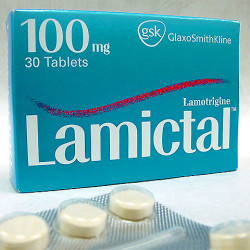Top Class Actions’s website and social media posts use affiliate links. If you make a purchase using such links, we may receive a commission, but it will not result in any additional charges to you. Please review our Affiliate Link Disclosure for more information.

It is particularly concerning when an individual contracts SJS or TEN after taking a necessary medication like Lamictal — which is used to manage seizure disorders and sometimes bipolar disorder — because instead of relieving health symptoms and allowing a person to live a more normal life, affected patients now have to contend with a rare skin disorder on top of whatever other condition they are already dealing with.
What is Lamictal?
Lamictal (generic lamotrigine) is an anticonvulsant medication manufactured by the pharmaceutical company GalxoSmithKline.
While this drug is occasionally used to treat bipolar disorder, it is most commonly prescribed to treat and manage focal seizures, as well as primary and secondary tonic-clonic seizures, related to epilepsy.
More importantly, it is one of the few medications approved to treat Lennox-Gastaut syndrome, which is a type of childhood-onset epilepsy that is difficult to treat and can lead to psychological problems and developmental delays because of the frequent seizures.
As a prescription drug, Lamictal is a potentially useful treatment for a variety of hard-to-treat health conditions. However, according to recent reports, this anticonvulsant medication has been linked to cases of Stevens Johnson Syndrome and Toxic Epidermal Necrolysis.
Because of these Lamictal SJS and TEN cases, the FDA has mandated a black box warning to be included in the drug’s prescribing information, warning the medical community and patients of the risk of developing SJS or TEN while taking this anti-seizure medication.
What is Stevens Johnson Syndrome?
Stevens Johnson Syndrome is a severe skin condition that occurs as an allergic reaction to certain medications, including Lamictal. When a patient first contracts SJS they may initially present with flu-like symptoms, quickly followed by burn-like rashes forming all over the body.
Blisters may also form on the skin, as well as the mucous membrane of the eyes, nose, and mouth. Eventually, the top layer of skin may slough off a patient’s body, leaving the more sensitive dermis layers exposed to infection.
Toxic Epidermal Nercrolysis is a more severe form of SJS. Patients are diagnosed with TEN when the rashes, burns, and blisters cover 30 percent or more of their body.
Symptoms of Lamictal SJS and TEN include:
- Flu-like symptoms, such as fever, sore throat, cough, and burning eyes
- Red or purple skin rash
- Hives
- Blisters on the skin and mucous membranes, especially in the mouth, nose and eyes
- Facial swelling
- Tongue swelling
- Skin pain
- Skin shedding (sloughing)
SJS patients have a 5 to 15 percent risk of dying from the side effects listed above; TEN patients have an increased mortality rate of 30 to 40 percent. Even if a patient is lucky enough to survive SJS and/or TEN, they may still contend with other life-long complications, such as:
- Secondary skin infection (cellulitis)
- Sepsis (blood infection)
- Eye problems that can lead to blindness
- Internal organ damage
- Permanent skin damage
If you or someone you love took Lamictal and developed this painful and detrimental skin condition, you may have grounds to pursue legal action against the drug’s manufacturer.
Do YOU have a legal claim? Fill out the form on this page now for a free, immediate, and confidential case evaluation. The Stevens Johnson Syndrome attorneys who work with Top Class Actions will contact you if you qualify to let you know if an individual lawsuit or class action lawsuit is best for you. [In general, SJS lawsuits are filed individually by each plaintiff and are not class actions.] Hurry — statutes of limitations may apply.
ATTORNEY ADVERTISING
Top Class Actions is a Proud Member of the American Bar Association
LEGAL INFORMATION IS NOT LEGAL ADVICE
Top Class Actions Legal Statement
©2008 – 2024 Top Class Actions® LLC
Various Trademarks held by their respective owners
This website is not intended for viewing or usage by European Union citizens.
Get Help – It’s Free
Help for Victims of Stevens Johnson Syndrome
If you or a loved one were diagnosed with Stevens Johnson Syndrome (SJS) or toxic epidermal necrolysis (TEN) after taking a prescribed or over-the-counter medication, you may be eligible to take legal action against the drug’s manufacturer. Filing an SJS lawsuit or class action lawsuit may help you obtain compensation for medical bills, pain and suffering, and other damages. Obtain a free and confidential review of your case by filling out the form below.
An attorney will contact you if you qualify to discuss the details of your potential case at no charge to you.
Oops! We could not locate your form.












